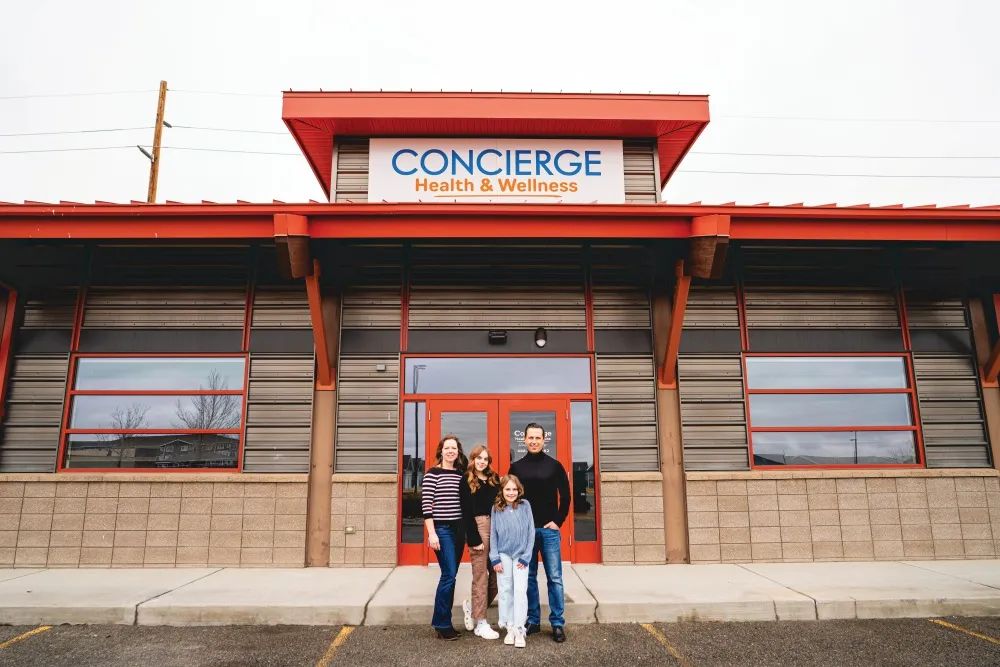
photo by Jamie Blotske
Revolutionizing Rehabilitation: A New Era of Personalized, Proactive Physical Therapy in Billings
March 2024
This month, a new addition to the Billings healthcare community is opening to deliver results-oriented, client-centered care in a medical spa-like environment. Concierge Health, located at 4120 King Avenue West, Suite 1, is owned by Heather Dibra, who has a masters of occupational therapy from the University of Florida and will be overseeing the operation, alongside her husband, Blerim Dibra, who has a doctorate of physical therapy from Florida International University and is a licensed medical massage therapist. Their approach takes a unique, proactive stance that they hope will be a game-changer in physical therapy, encouraging athletes to be seen before injury strikes.
Since starting his practice in 2010, Dr. Dibra realized the potential to change physical therapy delivery. The primary focus at that time was to help patients heal after an injury or surgery, but it didn’t offer much in terms of avoiding such trauma or heading off any problems at the outset. “We discovered that there was no true preventative musculoskeletal care for the active population: active skiers, runners, teenagers in sports,” he said. “We started to notice a lot of severe injuries in teenagers, such as ACL tears, ankle sprains, and rotator cuff injuries, which should not manifest until later in life.”
As parents of two young daughters, the Dibras saw the need firsthand. They realized during visits with pediatricians and routine sports physicals that doctors were screening heart, lungs, vision, and reflexes but weren’t assessing posture, muscle flexibility, joints, and the supporting structures, which are critical elements to preventing sports injuries.
Sensing that Dr. Dibra’s calling was to focus on injury prevention and offer an accelerated path for clients to return to full activity after trauma, surgery, or other setbacks, the Dibras opted to enhance their menu of services to include a broad range of the latest FDA- cleared treatments, with an emphasis on non-pharmaceutical, non-surgical options. Such options include robotic laser, spinal decompression, acoustic wave therapy, localized cryotherapy, infrared red-light sauna, and joint compressions, among others.

In an initial consult, clients will be assessed to ensure optimal ability to participate in their sport and make adjustments to avoid injury; sometimes, that can be as simple as a new pair of shoes designed to align the body properly. Clients are offered a menu of potential treatment options according to their age, activity level, expectations, and goals for physical activity, and both the client and provider work together to develop a customized treatment plan that fits within the client’s ideal timeline and budget.
“In our clinic, we will be offering a non-traditional approach to recovery of the body from injuries that can stem from slips and falls on ice, and/or chronic pain from repetitive motion, poor posture, somebody working at a desk, and having neck and shoulder pain, or somebody playing tennis, pulling a muscle in the hips or knees or ankles,” Dr. Dibra said.
Heather added that their aim is to provide education and personalized care to meet their clients’ needs. So, for example, if you have a child in gymnastics, they would first undergo a postural assessment to determine if there are any muscle imbalances, and Dr. Dibra would look at the structural integrity of all weight-bearing structures, including shoulders, elbows, wrists, lower back and neck, hips, ankles, and feet. The gymnast would walk the provider through the routine, noting anything that bothers them or causes pain. The athlete’s techniques would be observed, and targeted modifications and adjustments would be suggested. If they present with muscle aches and pains, Dr. Dibra would determine the best course of action to help speed up the healing process and offer optimal return to full function. If a more urgent issue, such as a systemic concern, is detected, the Dibras say they would refer their client to their primary care doctor for further evaluation.
Avoiding pain and injury goes beyond discomfort; Heather says it can alter your life. “When you have pain, it changes the way you move, and if you’re modifying your performance, you can create new problems and new injuries, and that muscle group is compromised,” she said. “Then you have multiple parts getting affected instead of the one that was affected in the first place. It just compounds your problems.” Ultimately, she said, it can lead to an athlete ending their involvement with the sport, becoming more sedentary, potentially negatively affecting mental health, and their overall condition can spiral downward.
One of the central tenets of their business model is to ensure that clients are seen in a timely fashion; there is no waitlist, and appointments are not offered based on the provider’s availability but on what the client needs. The new facility includes 12 private exam rooms, with room for more providers as they grow their operation.
Finally, the Dibras want to change how people perceive physical therapy. “We want to overcome the notion that physical therapy is an uncomfortable or painful experience. It should not be a punishment to go to physical therapy,” Heather said. “We want people to come to heal in a peaceful environment, walking out happy, feeling better, and knowing more than when they came in.”
Originally printed in the March 2024 issue of Simply Local Magazine
Never miss an issue, check out SLM's digital editions here!




